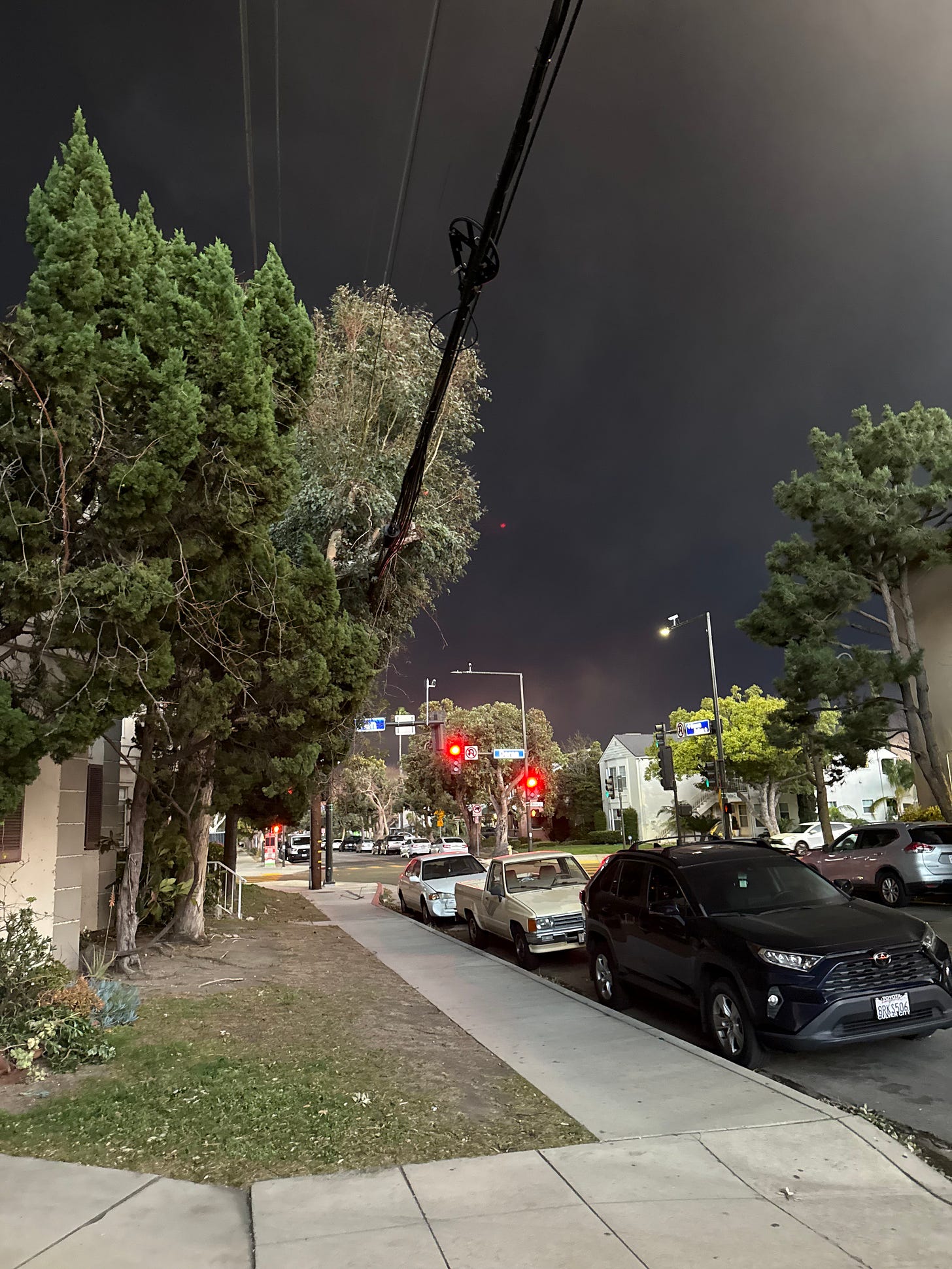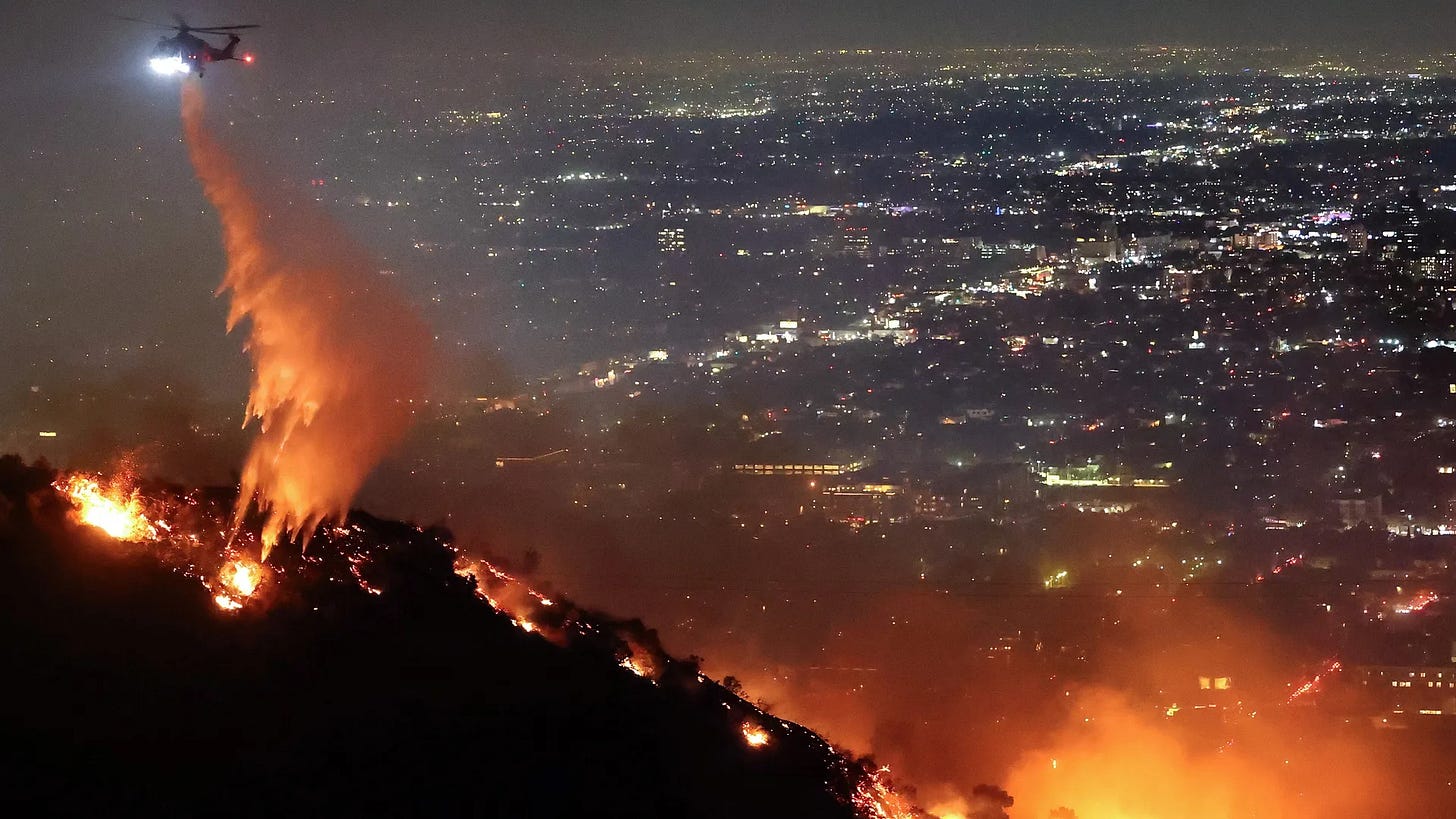Fire On The Mountain
On a week without music, and relief efforts from a terrifying natural disaster.
Last week was the first time that I didn’t feel like listening to music. Not the first time in a certain number of years—the first time I can really ever remember feeling like that. I tried, and it didn’t work.
If you’re not in LA, you probably don’t understand what it felt like. The curious mix of sheer panic and reassuring feelings—the “we’re probably going to be okay, but maybe we won’t be.” The “we’re okay, but what about the people who aren’t?” It’s hard to be positive about dodging the fire when your friends and loved ones don’t have a house anymore.
This is a specific mix of emotions underlined by terrified awe. Because the most striking thing about fire is not its pure destructiveness or its seeming randomness—it’s the hunger.
Fire is not a living thing, but it might as well be: it breathes oxygen and spits out carbon, just like us. It eats plants and destroys landscapes, ripping up the roots and destroying habitats, just like us. It cannot survive without the food that the Earth provides, and that we, in urban societies, often provide for the fire on a platter. That’s what makes it scary. It’s not a hurricane—forecastable, predictable, escapable—or an earthquake, which is instant. Fire burns, and burns, and burns, until it’s sated or put to death. It mocks us, nags at us, makes us worry as it tears an erratic path through our lives.
On Tuesday, January 7th, a colleague and I drove from West Hollywood to East Pasadena for a work dinner through the worst windstorm Los Angeles had seen in almost 15 years. The power flickered on and off on entire city blocks. Street signs waved and swayed like reeds in a pond, and a tree branch stopped a Tesla in its tracks as we drove by on the 134 freeway.
As we approached the San Gabriel Valley, we heard through the text grapevine—this is at least a few hours before everyone had Watch Duty on their phones—that a fire had started in Altadena, about three miles from where we were supposed to have dinner. We probably should have cancelled, but we didn’t. After all, we drove all that way through a storm that tried its damnedest to stop us. Why give up then?
It was a day full of foreboding, both real and imagined. Earlier, in the morning, I stepped out to get a breakfast burrito and the streets of West Hollywood already smelled like smoke—it wasn’t even 10 AM. A fire broke on the Sunset Strip, perilously close to houses, but quickly put out by the fire department. The nameless fire was immortalized with a photo behind a RuPaul’s Drag Race billboard that quickly became the butt of jokes.
But it was no joke. At the same time, about ten miles west, a fire started in the Pacific Palisades that would alter the course of Los Angeles forever less than 12 hours later. The ominous ridge of fire was visible from most of the city, egged on by gusts of wind that kept slamming bits of palm tree into our eighth-floor office windows. The lights flickered as the hours went on, and the more debris flew through the air like we were inside some slow-motion, long-lasting tornado.
Once we finally left West Hollywood and moved away from the big, scary fire on the coast, I had the distinct feeling that we should not be driving across town in Category Two hurricane-strength winds. But even to go home, instead of that work dinner, would require a drive through Burbank, the area with the strongest winds, over 100 miles per hour. I don’t know if the gusts actually reached that high, but it sure felt like it. I was more afraid than I would’ve liked to admit at the time.
But nothing—not the apocalyptic flying palm trees or trunks blocking the highway or smoke billowing in the distance—could have prepared me for the sight of Eaton Canyon on fire as we drove on the 134, and then the 210, freeways.
The Eaton Fire looked like it was right there, like you could put your hand out the car window and feel the flames at your fingertips. This wall of angry red on a pitch-black canvas obscured the carnage that was already happening below, as untold houses burned while the fire grew at a rate of over 100 acres per hour. It’s hard to comprehend what any of those numbers mean until you’re confronted with an entire hillside aflame right in front of you.
We had our work dinner, with my coworkers showing up one-by-one, visibly shaken and sometimes visibly shaking. I panicked and told my husband not to pick me up, because he would have to use the 210 freeway, where embers were falling. We ended up at my mother in law’s house in Pasadena. Even though this was closer to the fire, we wanted to be with her in case she had to evacuate. That began four days that felt like a fugue state, if you replaced the amnesia with an anxiety so thick and oppressive it felt like it was floating in the air alongside the dust, smoke and god knows what else.
Life was an uncanny mix of emergency alert and business-as-usual. I ate a breakfast sandwich on a patio under a brown sky with four other full tables, all of us wiping ash that was falling around us, off our clothes and off our food. Why were we eating outside? Good question. It didn’t seem like anyone was thinking properly.
As new fires popped up and were put out like a whack-a-mole game, reality came unglued. I come from a place where wildfires are frequent, but not usually in urban areas. This was like if any part of the city—a metropolitan sprawl of over 10 million people—could spontaneously combust at any moment, taking people, houses, and cars with it. Text message conversations and group chats became a form of unhappy mad libs: have you evacuated? Do you need to evacuate? Are you back home yet? Can I drink the water? Will I have to evacuate? Should I turn my AC off? Do you have any N95 masks?
The week was full of cruel twists: a friend whose house had burned down in Altadena evacuated, with their newborn, to the Hollywood Hills, and then had to evacuate again to escape a new fire that had broken out in an area of the Hollywood Hills that is both densely populated and densely vegetated, a massive threat to one of the most famous neighborhoods in the world. Meanwhile, I was staying in Pasadena, close to the fire, watching the evacuation zones creep closer and closer to my farther-away home in Glendale. These erratic movements and sudden flare-ups only underlined the random destructiveness of this force of nature.
With the Sunset Fire, it was beginning to feel apocalyptic. Somehow the heroic fire department managed to quell the blaze, along with another one that started the same time a couple miles north in Studio City. Things started to look up. We—well, they—could fight this thing, and maybe, just maybe, it wouldn’t get any worse.
As I write this, Los Angeles is in its second week of these massive wildfires, making it through a second week of windstorms with sustained “record dryness” increasing the risk even without the gusts. The fire department is more prepared this time around, reinforced with crews sent from all around the Western half of the US, even Canada and Mexico. Lessons have already been learned, and there’s a veritable Air Force of aerial vehicles ready to combat any new blazes that appear on the Watch Duty grid, like some survival horror video game come to life.
But it’s not a video game, and it’s not programmed or predictable. The fire moves slowly and quickly all at once, and overtakes all things in its path until the fuel runs out. It makes you feel powerless, even helpless. It might make you wonder why you live in a place like this to begin with. And even if you outrun the fire, you won’t outrun the smoke, or the chemicals and carcinogens the fire puts in your lungs. It’s a natural disaster like no other, only made worse by the unnatural factors that have allowed it to grow so out of control. (I recommend the gripping book Fire Weather, about the fires that consumed the Canadian oil town Fort MacMurray, for a primer on both the physics of fire and the way it collapses social order and destroys communities.)
Last week I didn’t feel like listening to music—certainly not writing about it or publishing something about it. This is what I felt like: sawn-off thought fragments colliding with each other in my mind, or coiling around each other forming knots in my gut. The sheer scale of it makes everything else feel trivial. And nothing bad even happened to me or my family.
It was a week of expecting the worst and then realizing that the worst is somehow worse than you expected. Sometimes it feels like we’ve gone through the worst of this remarkably early fire season, but even in that best-case scenario, the city—and tens of thousands of people who live in it—will never be the same. We’ll go back to music, art, and entertainment with a new perspective. And hopefully with more gratitude, thought, and care. Some of us will recover more quickly than others, or will find solace in different things, whether that’s music or family or community or volunteering.
For now, those lucky enough to have kept their homes and their lives steel themselves, while others try to rebuild. There is a spreadsheet for supporting musicians impacted by the fires floating around that you can find here, and hip-hop legend Madlib is also raising funds after his house burned down in Altadena.
Other fundraisers and charities:
As the smoke clears, the damage only comes into clearer focus. It’s going to be a long winter in LA. But this city, my adopted home, has been through periods of destruction and uncertainty before, and it will survive this, too—primarily through the generosity and compassion of its residents as well as its neighbors.
Futureproofing will resume next week.









